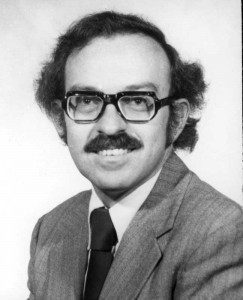
One of the fascinating—and sometimes disconcerting—things about researching recent history is that my historical characters are still making history. They write books, participate in protests, and occasionally die. This summer, happily, they’re retiring more than dying. In the span of about a month, two subjects of Moral Minority’s eight mini-biographies are retiring. Richard Mouw, president of Fuller Theological Seminary, retired in June. Now it’s Ron Sider’s turn. Founder and president of Evangelicals for Social Action, Sider will step down this weekend after forty years at the helm.
Sider’s list of accomplishments is impressive. In 1972 Sider launched Evangelicals for McGovern, the first partisan political organization of the twentieth century formed by evangelicals to elect a president. A year later he organized a series of “Thanksgiving Workshops” out of which the Chicago Declaration, the landmark document of the postwar evangelical left, emerged. His 1977 Rich Christians in an Age of Hunger (which has sold over 400,000 copies—not bad for a dark tome!) argued that global economic injustices cannot be addressed simply through individual social ethics. They must be tackled structurally through such actions as lobbying Congress to reduce military spending and to drop barriers to imports from developing nations. In the decades since, Sider’s progressive vision has persisted. With the exception of a vote for George W. Bush’s “compassionate conservatism” in 2000 that he now regrets, Sider has routinely embraced and stumped on behalf of many liberal Democratic policies.

If social action has defined Sider’s career, it has been grounded in an explicitly evangelical spirit. Sider has stressed the evangelical mandate to lead people “to accept Jesus Christ and personal Lord and Savior.” He has affirmed the uniqueness, deity, resurrection of Christ. In apologetics work for InterVarsity Christian Fellowship in the 1960s and 1970s, Sider proffered historical and philosophical evidences for theism. In his 2006 jeremiad Scandal of the Evangelical Conscience, Sider pushed for sexual holiness and criticized evangelicals for rates of sexual promiscuity and divorce that surpass those of non-evangelicals. Sounding a lot like Joshua Harris (except for the going on dates part), Sider has written, “Could we behave the way we often do in our families and with our dates if we made those decisions with our eyes fixed intently on the Lord?” Elsewhere, he has written about “devotional snuggling,” his practice of starting and ending days praying with his wife while enveloped in each other’s arms.
This combination of conservative evangelical practices and progressive politics has made Sider a religious and political outlier in many respects. Sider’s pro-life, pro-peace activism, pro-poor, pro-racial justice, pro-sexual integrity, pro-family, and pro-environment politics—articulated most clearly in Sider’s 1987 book Completely Pro-Life—fail to conform to platforms of either political party. This mix of ideals, clearly idiosyncratic in the postwar political and cultural climate, has attracted an eclectic and loyal, if not always large, following.
 Devotees of Evangelicals for Social Action will be gathering this weekend in Philadelphia to celebrate ESA’s fortieth anniversary. Called Follow.Jesus.2013, the conference will include a gala and roast honoring Sider as well as an impressive list of evangelical speakers including Shane Claiborne, D. Michael Lindsay, Wesley Granberg-Michaelson, Lisa Sharon Harper, Jim Wallis, and Soong Chan-Rah. I’ll be there too—and will give a report here at the Anxious Bench later this month.
Devotees of Evangelicals for Social Action will be gathering this weekend in Philadelphia to celebrate ESA’s fortieth anniversary. Called Follow.Jesus.2013, the conference will include a gala and roast honoring Sider as well as an impressive list of evangelical speakers including Shane Claiborne, D. Michael Lindsay, Wesley Granberg-Michaelson, Lisa Sharon Harper, Jim Wallis, and Soong Chan-Rah. I’ll be there too—and will give a report here at the Anxious Bench later this month.












